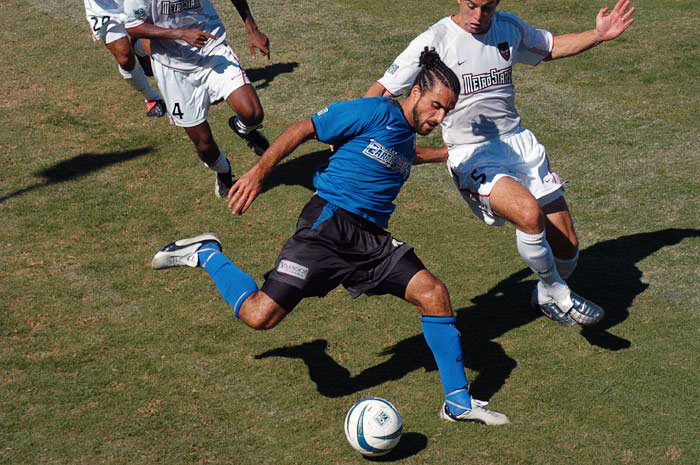In Limbo: News and Notes
| by Tim Froh DaMarcus Beasley moves to Manchester City? It's astonishing really, what a change of scenery can do for a person. DaMarcus has expressed his frustration with life in Eindhoven for a year now, and it wouldn't surprise me if this rumored, nearly confirmed, move to the English Premier League gave Beasley the fire and determination he needs to jumpstart his career. It's a win-win situation for both clubs. Manchester City needs a true left-sided midfielder (they were so desperate opening weekend that they started Claudio Reyna there), and Beasley needs a team that is committed to helping him raise his game and get him playing time, which PSV, for all the good it's done for DaMarcus, just isn't right now. At the very least, this move makes a lot more sense than coming to Real Salt Lake. Heath Pearce with offers from abroad? Young American left back Heath Pearce has apparently received offers from several foreign clubs including Celtic of the Scottish Premier League and Hannover 96 of the German Bundesliga. This is great news for Pearce, even if he and his agent can't work out the deal before the transfer window closes. While it's good news for Pearce, this is bad news for MLS. As more and more young American players go to the Scandinavian leagues for the higher pay, foreign experience, one can now add the increased exposure to European leagues as well. MLS can't offer these kids the kind of money that the Scandinavian leagues can (sometimes as much as ten times the salary), nor can they any longer promise that MLS will earn them a move abroad. This especially rings hollow as the league rejects more and more offers for its more marque players (Johnson, Dempsey, Joseph, Conrad, among others). MLS rejects Celtic's $1 million offer for Shalrie Joseph. This is the only understandable rejection that I've seen so far. Not only is Joseph one of the league's best players, but he's also a commodity on his team, and had MLS sold he and Dempsey so close to the playoffs, Revolution fans would understandably be upset. The $1 million offer tabled by Celtic is indeed low for a player of Joseph's skill, but hopefully MLS told Celtic to field a better offer rather than just reject the offer outright. Even so, that MLS refuses to part with some of their players, including ones that want to leave (Dempsey and Johnson most specifically), is foolish. Yes, offers for Dempsey were low, but how does the league explain away their rejection of the Johnson deal which was reportedly worth around $2 million? MLS brass need to sit down and figure out what their strategy is exactly. Do you keep a player like Johnson who obviously doesn't want to be here, isn't considered an asset to his team, is costing you nearly $1 million in salary a year, and whose value is depreciating every day? Or do you sell him now and cut your losses? Announcement on the Kansas City franchise expected today. Announcement of a sale? Stadium news? Franchise move? With Don Garber attending, the chances are high that today's announcement is either really good news or really bad, but there's no way that this announcement will be inconsequential. Hugo Sanchez rumored to be in the running for next coach of the U.S. Men's National Team. Whether this is true or not, I've found the reactions that this rumor has elicited over on Bigsoccer to be monumentally amusing. Personally, I don't care where our next coach is from, so long as he gets the results. However, I've never been sold on Sanchez's ability, despite his two titles with Pumas. Likewise, I'm not entirely sold on Klinsman, nor on Nowak. Not that any of these gentlemen shouldn't be considered. They should certainly be considered since they all have tremendous coaching potential, having achieved some success at club level (Nowak, Sanchez) and at the national level (Klinsman). The most experienced and decorated coach in MLS is Frank Yallop, and I hope that he is strongly considered for the position regardless of his problems with the Canadian National Team (which has as much to do with the failures of the Canadian FA than it does with Yallop's coaching ability). People tend to react negatively to Sanchez because he's Mexican, but I'd welcome it, if not only to see what kind of hysterical overreactions it would elicit from Mexican National Team supporters. Finally, Kansas City Wizards and U.S. National Team forward Josh Wolff has his work permit rejected, and his hopes of playing for Derby squashed. Poor guy. Your heart really has to go out to him since this was probably his last chance to play abroad. The ruling is, of course, a load of bullocks. Nevertheless, let's all hope he gets another chance. |




